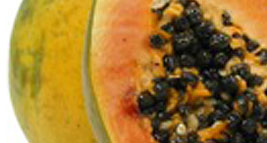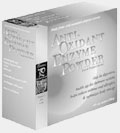What are the main characteristics and properties of Fermented Papaya Extract?
Itís an extract made from papaya fruits harvested and selected in tropical countries, in particular
the Philippines. These fruit grounds are then fermented by yeasts over several months until they reach a
certain temperature. Eventually, an extract is obtained, a white powder containing obviously many ingredients,
not all of which have been analyzed. But this fermented papaya extract contains, in particular, small sugar
molecules, called oligosaccharides.
What are its main properties?
A number of studies, particularly in the US, show that this fermented papaya extract has both antioxidant and immuno-stimulant properties.
Are these human studies or only in vitro studies?
They are mainly in vitro. But there have been findings from human studies including, in fact, our own from work with AIDS patients. Alone, fermented papaya extract is not very active. But when it is ingested after a tri-therapy which reduces the proliferation of the virus, fermented papaya extract helps revive immune system parameters. Often, tri-therapy alone, even after many months, does not succeed in reviving these immune system parameters, or at least it does so very slowly. Numbers of CF4 lymphocytes recover very slowly. With fermented papaya extract, they do so much more quickly. We also see an improvement in the patientís condition - weight gain, increased hemoglobin levels Ė i.e., very favorable signs.
Much better than would be possible with other nutrients, such as selenium?
Well, you would need to do proper comparisons, and carry out strictly controlled studies to compare it with other antioxidants. This study was conducted in Africa at our foundationís centre (CIRBA, Abidjan) under quite difficult conditions.
How many patients were involved?
We examined 12 patients. Of course, weíre now keen to carry out more rigorous trials, over longer periods and comparing different types of antioxidants where we may also see their individual effects combine to good effect.
I should add that fermented papaya extract seems to be equally active as an immunostimulant in preventing the onset of much less serious health problems, such as the common cold.
Have you carried out studies on this?
No, these are just personal observations, based on information from the manufacturer.
Have you tested this yourself? If you feel a cold coming on, what dose do you take?
I take two sachets of fermented papaya extract, under the tongue, and over the next few hours my symptoms regress.
For how many days do you take it?
I just take it at the beginning, thatís all. You can of course continue to take it but fermented papaya extract is less effective once the cold is underway. It acts mainly at the start of a bacterial or viral invasion.
How do you explain its effectiveness?
I think it acts as an immunostimulant at a local level in particular, at the level of mucous immunity. This product is taken under the tongue and itís therefore reasonable to think it has an effect on the oral-pharyngeal mucous and surrounding area.
I presume the dose is different for treating AIDS patients?
An AIDS patient can take more, and over several months Ė in the region of 4 sachets a day taken morning and evening. Itís important to take it at both these times of day.
Why morning and evening?
For optimum absorption. Fermented papaya extract should not be taken on a full stomach, as it has less effect. Given that itís primarily absorbed via the tongue, it should preferably be taken before a meal.
As a nutritional supplement, what other applications does fermented papaya preparation offer?
For now, it must be used as a nutritional supplement. However, if well-conducted clinical trials show that it is an effective adjunct to serious therapies, say chemotherapy, anti-viral and anti-AIDS therapies or for cancer, I would not rule out the possibility that fermented papaya extract could become an actual drug.
Is it also useful for hepatitis?
It probably has an anti-viral effect in hepatitis but I donít have any data of my own on this.
Are you planning other studies?
Yes, of course, weíre planning larger-scale studies, both in developing countries like Africa, as well as in Europe and possibly the United States, simply to demonstrate this antioxidant effect. In Belgium, for example, we now have at our disposal a company which has developed extremely sensitive tests to detect antioxidant effects. I believe that we will very quickly be able to demonstrate in humans Ė in plasma, from a small blood sample Ė the antioxidant effect of fermented papaya extract.
No plans for studies in France?
Yes Ė if I can find the funding. I have approached the new authorities and am currently awaiting their response.
Belief in the effectiveness of such antioxidants is not widespread in France, is it?
There is considerable ignorance about this subject in certain scientific and medical circles where they think fighting oxidative stress simply comes down to taking vitamin C or vitamin E.
In fact, thereís now a huge range of antioxidant products, some plant-based, some based on endogenous substances such as glutathione, which can be made absorbable. Unlike Japan and the US, these products are not widely available in France. There are also enzymes such as superoxide dismutase, copper-zinc-dependent, which is now produced in France. It should now be possible for these antioxidants to be tested in strictly-controlled clinical trials. And we now have very objective criteria for measuring antioxidant effect in plasma and at leukocyte level.
But the French scientific community as a whole is still not entirely convinced?
Well there are quite a number of clinicians and scientists who are. We have therefore created in France, as in the United States, an Oxygen Club which I and my colleagues run at the Pasteur Institute. About three or four years ago, we organized an international conference on this subject and a similar event will take place this year in Paris in July. There are very active groups in France but often they do not communicate with each other. Itís a pity, for example, that the virologists are not interested in these antioxidant products.
Is there not another problem, that of dosage? If one sticks to the RDA, supplementation might not be that effective?
I think that we should tailor the antioxidant treatment to each person according to their status. Itís apparent from our tests that individuals differ widely. We should gear the antioxidant dose accordingly. Certain individuals have deficiencies which need addressing. But these deficiencies will not necessarily be the same for everyone. Thereís quite a choice of products available, mainly nutraceuticals at the moment, to restore an appropriate redox status and reduce oxidative stress. These antioxidant products can not only produce effects in the short term, in the sort of acute cases Iíve mentioned, but also in the long-term. I believe that we can prevent premature ageing as well as the onset of degenerative nervous diseases such as Parkinsonís disease with the right antioxidant treatment addressing particular deficiencies in particular individuals.
I believe treatment should always be rational but itís really moving more into the framework of predictive and preventative medicine Ė I mean, a number of tests can be done to evaluate an individualís antioxidant or pro-oxidant status. I can tell you that, right now, we are working to develop even more sensitive tests. Itís only once these tests have been done, and repeated several times to see whether or not there are any slight problems, that one can institute a treatment.
Unfortunately very few, Iím sorry to say. I think the whole future of medicine should be directed towards predictive and preventative medicine since it is much less expensive for society, better for the individual and preferable to the curative medicine or mutilating surgery practiced at present. I believe itís much better to treat someone who is still in good health, rather than waiting until they are bedridden in hospital.
No. I think that, if my view prevails, we could establish analysis centers in France just as we have done at Liege in Belgium. There are some laboratories in Paris who carry out tests on oxidative stress. But theyíre not well-known and they are privately-run. I believe we should have a whole network of these centers where people could go to be tested. But that would require the sort of education initiative where healthy people are encouraged to get themselves tested regularly at these centers and to take advice from their doctors even when they are not ill. In fact, AIDS patients already have this attitude as they are treated on the basis of biological markers before they become ill. And it works and prevents them from picking up infections which are then difficult to treat.
Absolutely. I think it will definitely have a place.





